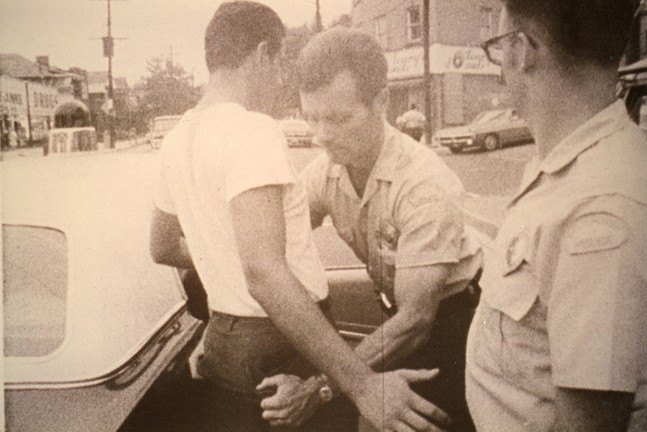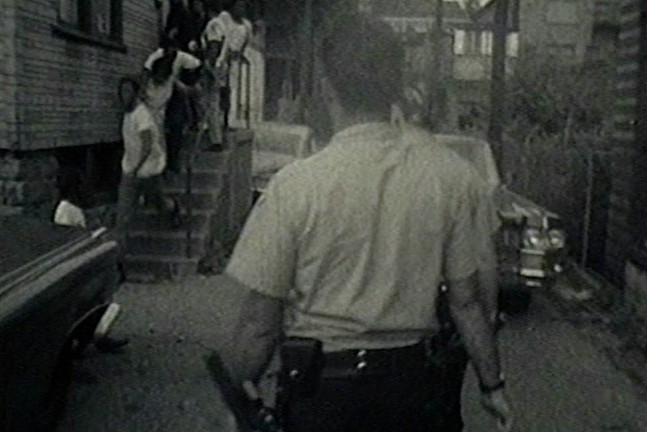We are about to see a time capsule from the tail end of the days when you would reach the Pittsburgh Police just by dialing 765-1212.
Pittsburgh Police 1969, playing Fri., Sept. 23 through Wed., Sept. 28 at the Harris Theater, contains hours of documentary footage of Pittsburgh Police officers working throughout the city in, you guessed it, 1969. The Sept. 23 and Sept. 24 screenings will also include panel discussions about cameras and policing.
The footage, shot on 16mm film, includes unscripted scenes from inside police cruisers, at private residences to which police have been called, and in station meetings, courts, and interrogation rooms, among other settings, showing police interactions with Pittsburgh residents. Acquired by local filmmaker Will Zavala, a visiting lecturer at the Univerity of Pittsburgh, and distributed by Documentary Educational Resources, the film features vignettes split into four categories: the job, searches and seizures, asking questions, and public place.
Watch a trailer for the film below:
Pittsburgh City Paper watched about an hour of the footage, which will be shown in two parts, and found it alternately distressing, fascinating, hilarious, and bizarre.
Of course, it’s always a pleasure to see a slice of yinzer life from the old days. A cop drives past a pedestrian they suspect is up to something, grumbling, “You think you’re making jagoffs of us, you’re crazy.” Far less pleasant are the scenes of police officers questioning Black suspects without lawyers and magistrates dismissing the arguments and concerns of Black defendants.
The footage was originally shot by a Brandeis University researcher looking to consider police conduct in the aftermath of the assassination of Martin Luther King Jr., and while it’s been used for educational and training purposes throughout the country, it’s never before been publicly shown in Pittsburgh.
In one notable interlude, the camera follows two cops as they attempt to arrest a drunk driver. The man’s sons insist on coming with them in the cop car, which the police don’t like. They yank one of the kids out of the car, starting a comical brawl between the police and the young white men. At one point, one of the sons ducks under the legs of a police officer and stands up, lifting the officer onto his shoulders and tossing him on top of the police car, where he flops like a fish for a few moments.
When violence erupts — more than once, it appears that the police were responsible for escalating the situation — it can be difficult to determine what is actually happening between a police officer and the person they’re attempting to overpower.
Later, the camera captures the officers debriefing the brawl amongst themselves and catches an interesting exchange in which an older cop argues that the job isn’t actually that dangerous.
“Nine out of 10 fights on this job, that guy ain't really trying to hurt you. He don’t wanna be taken in but he ain’t trying to hurt you,” he says.
It’s difficult to imagine such a statement coming from a police organization today, given how often police representatives emphasize the perceived danger of the job alongside their rejection of oversight measures. Pittsburgh Police 1969 also strikingly draws attention to the intense militarization of local police departments that has occurred in the last 50 years, making the film an important artifact.
“The cops physically look different than cops today,” Zavala tells WESA. “They’re not wearing body armor or a lot of the accessories that they wear today. My impression is that they were a less intimidating presence."
Pittsburgh Police 1969. Fri., Sept. 23-Wed., Sept. 28. Harris Theater. 809 Liberty Ave., Downtown. $11. trustarts.org



















